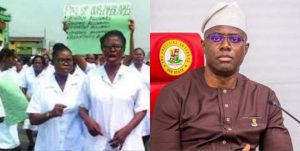Senate Top Stories: CBN Governor’s Tenure, $496m Probe, Ajaokuta Steel Company,

A new proposal in the Nigerian Senate seeks to limit the tenure of Central Bank of Nigeria (CBN) chiefs to a single non-renewable term of six years, amidst ongoing political controversies. The bill comes just months after separate bills were introduced to bar governors and deputy governors of the CBN from participating in politics. The new bill, sponsored by Adetokunbo Abiru (APC, Lagos East), aims to reduce political influence on monetary policy decisions.
The proposal follows previous bills discussed in October last year, which were separately sponsored by Sunday Karimi, the senator representing Kogi West District, and Darlington Nwokocha, the former senator for Abia Central. These bills were prompted by former CBN governor Godwin Emefiele’s controversial bid to run for president in the 2023 elections without resigning from office.
During the recent Senate session, lawmakers debated extensively on the amendment bill. Mr. Abiru argued for a single non-renewable term of six years, stating that it would enhance the independence of the CBN and its decision-making process. The bill passed a second reading and was referred to the Senate Committee on Banking, Finance, and other Financial Institutions.
In another development, the Senate has initiated a probe into the disbursement and usage of $496 billion obtained by the immediate past administration of former president Muhammadu Buhari from the CBN under the leadership of Mr. Emefiele. The probe was prompted by concerns raised by some lawmakers, including Senate President Godswill Akpabio, regarding the impact of the huge loan on the country’s economy.
Meanwhile, efforts to revive the Ajaokuta Steel Company in Kogi State have gained momentum, with the Senate constituting a 10-member ad hoc committee to investigate the reasons behind the plant’s moribund state. The committee was formed after a motion sponsored by Natasha Akpoti-Uduaghan (PDP, Kogi Central) highlighted alleged bureaucratic corruption and lack of political will as major factors contributing to the plant’s inactivity.
In a separate development, the Senate rejected a bill seeking to include Anambra State in the Niger Delta Development Commission (NDDC). The bill, introduced by Tony Nwoye (LP, Anambra North), was rejected on the grounds that it could set a precedent for other oil-producing states like Lagos and Kogi to demand inclusion in the NDDC.
Controversially, the Senate passed a bill to extend the tenure of service of legislative staff at the National Assembly from 35 to 40 years and the retirement age from 60 to 65 years. The bill, titled “Harmonised Retirement Age for Staff of National Assembly Service Bill, 2024,” was passed amidst controversy and has become a subject of litigation at the National Industrial Court.
Additionally, a nominee from the South-east for membership of the board of the CBN, Urum Eke, rejected his nomination, citing a conflict of interest due to his consultancy work with the World Bank and other international financial institutions. His rejection was announced by Senator Orji Kalu (APC, Abia North) during a Senate session.
The various legislative actions and controversies highlight the complexities and challenges facing Nigeria’s political and economic landscape, with lawmakers striving to address critical issues while navigating contentious debates and legal challenges.
Premium Times







